158537 results in Cambridge Library Collection
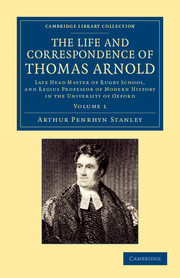
The Life and Correspondence of Thomas Arnold
- Late Head Master of Rugby School, and Regius Professor of Modern History in the University of Oxford
-
- Published online:
- 05 December 2015
- Print publication:
- 15 November 2012
- First published in:
- 1844
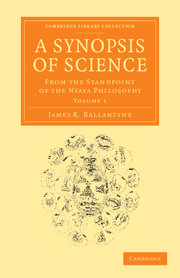
A Synopsis of Science
- From the Standpoint of the Nyaya Philosophy
-
- Published online:
- 05 December 2015
- Print publication:
- 21 February 2013
- First published in:
- 1852
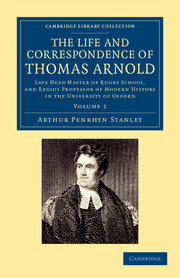
The Life and Correspondence of Thomas Arnold
- Late Head Master of Rugby School, and Regius Professor of Modern History in the University of Oxford
-
- Published online:
- 05 December 2015
- Print publication:
- 15 November 2012
- First published in:
- 1844
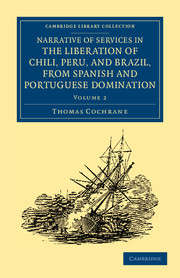
Narrative of Services in the Liberation of Chili, Peru, and Brazil, from Spanish and Portuguese Domination
-
- Published online:
- 05 December 2015
- Print publication:
- 15 November 2012
- First published in:
- 1859
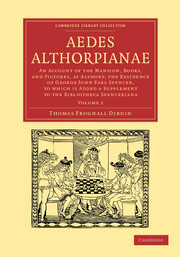
Aedes Althorpianae
- An Account of the Mansion, Books, and Pictures, at Althorp, the Residence of George John Earl Spencer, K.G: To Which is Added a Supplement to the Bibliotheca Spenceriana
-
- Published online:
- 05 December 2015
- Print publication:
- 15 November 2012
- First published in:
- 1822

The Oriental Collections
- Consisting of Original Essays and Dissertations, Translations and Miscellaneous Papers
-
- Published online:
- 05 December 2015
- Print publication:
- 21 March 2013
- First published in:
- 1800
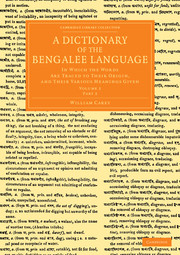
A Dictionary of the Bengalee Language
- In Which the Words Are Traced to their Origin, and their Various Meanings Given
-
- Published online:
- 05 December 2015
- Print publication:
- 28 February 2013
- First published in:
- 1825
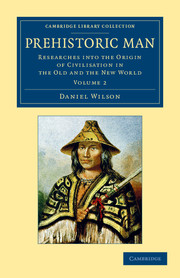
Prehistoric Man
- Researches into the Origin of Civilisation in the Old and the New World
-
- Published online:
- 05 December 2015
- Print publication:
- 15 November 2012
- First published in:
- 1862
Free-will
- from TABLE-TALK
-
- Book:
- The Table-Talk of John Selden
- Published online:
- 05 June 2016
- Print publication:
- 12 November 2015, pp 74-74
-
- Chapter
- Export citation
Prayer
- from TABLE-TALK
-
- Book:
- The Table-Talk of John Selden
- Published online:
- 05 June 2016
- Print publication:
- 12 November 2015, pp 163-166
-
- Chapter
- Export citation
Epitaph
- from TABLE-TALK
-
- Book:
- The Table-Talk of John Selden
- Published online:
- 05 June 2016
- Print publication:
- 12 November 2015, pp 63-63
-
- Chapter
- Export citation
Judgments
- from TABLE-TALK
-
- Book:
- The Table-Talk of John Selden
- Published online:
- 05 June 2016
- Print publication:
- 12 November 2015, pp 93-93
-
- Chapter
- Export citation
Priests of Rome
- from TABLE-TALK
-
- Book:
- The Table-Talk of John Selden
- Published online:
- 05 June 2016
- Print publication:
- 12 November 2015, pp 183-184
-
- Chapter
- Export citation
Year
- from TABLE-TALK
-
- Book:
- The Table-Talk of John Selden
- Published online:
- 05 June 2016
- Print publication:
- 12 November 2015, pp 231-232
-
- Chapter
- Export citation
CORRIGENDA
-
- Book:
- The Table-Talk of John Selden
- Published online:
- 05 June 2016
- Print publication:
- 12 November 2015, pp 258-258
-
- Chapter
- Export citation
Knights Service
- from TABLE-TALK
-
- Book:
- The Table-Talk of John Selden
- Published online:
- 05 June 2016
- Print publication:
- 12 November 2015, pp 105-105
-
- Chapter
- Export citation
Tradition
- from TABLE-TALK
-
- Book:
- The Table-Talk of John Selden
- Published online:
- 05 June 2016
- Print publication:
- 12 November 2015, pp 211-211
-
- Chapter
- Export citation
Frontmatter
-
- Book:
- The Table-Talk of John Selden
- Published online:
- 05 June 2016
- Print publication:
- 12 November 2015, pp i-i
-
- Chapter
- Export citation
Invention, Human
- from TABLE-TALK
-
- Book:
- The Table-Talk of John Selden
- Published online:
- 05 June 2016
- Print publication:
- 12 November 2015, pp 92-92
-
- Chapter
- Export citation
Friars
- from TABLE-TALK
-
- Book:
- The Table-Talk of John Selden
- Published online:
- 05 June 2016
- Print publication:
- 12 November 2015, pp 74-75
-
- Chapter
- Export citation


